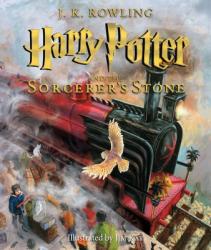
I suggest the book to people, who want to enjoy an intriguing, fast paced novel, Harry Potter and the Sorcerer's stone is the perfect book for those people.
This novel is the first of the seven famous Harry Potter books by J. K. Rowling. This book is about 11 year old Harry Potter, who receives a letter from Hogwarts, which is a school of witchcraft and wizardry.
This book is full of imagination like at one point, Harry Potter is asked to catch the golden ball, while he is flying on the broomstick. Then he stands up on the broomstick and tries to catch the golden ball unexpectedly he falls off from the broomstick and throws up the golden ball to winning the game for his team.
This book keeps you involved throughout the book.
Harry Potter and the Sorcerer's Stone is a good book to spark joy and imagination for anyone, regardless of age.
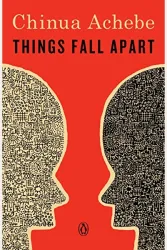
The novel was set down in 1958 by Nigerian writer Chinua Achebe, who was the inventor of modern African literature. It is one of the most widely read novels in the world and also has a prestigious role in African literature.
It tells the story of a great wrestler, Okonkow, who is the best warrior among the people, and he hasn't inherited that honor, fame, and reputation from his father or ancestors, as it happens in most of the cases. He becomes a well-respected man, and the tales of his bravery and fighting spread like a bushfire in the other villages .
Things Fall Apart is a true picture of Nigerian culture, language, living style, their religion, different sorts of gods (God of Earth, Goddess of Fire, etc.), and customs, and the people are very much attached to their traditions and religion. Especially, the proverbs are also a big part of their culture. You could sense their importance from this proverb:
"Proverbs are the palm oil with which the words are eaten "
Okonkow is ostracized form the village for seven years for killing one of the clansmen. In his absence, an Englishman comes into his village, asks permission from the tribesmen to live there, and gets it. That's the point where the Nigerian culture's destruction starts. White men come one by one and build colonies to recite there.
So, their traditions, religion, and gods are all crucified ghastly by white missionaries who call Africans uncivilised, savage, and dark people and say we are the ones who came to give them light and are gonna make them civilised, but eventually they put them into the heart of darkness and are responsible for their destruction.
All the nations are known by their own traditions, culture, religion, and language . How could you make an organised nation by destroying its culture? White men came to show Africans a way to come out of their darkness, but the real darkness was inside them. It is a worthwhile novel and should be read.
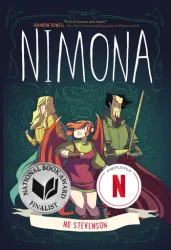
It's a rare treat to find a graphic novel with well-rounded characters, an interesting story, and an art style that has range. Even if it started as a webcomic, Nimona shows a surprising amount of depth for the medium. Sure, some of the early parts were clearly encapsulated in a serial format, but they were a quick way to introduce the characters and setting. When the story has some room to grow, it gets even better. It's definitely a page-turner, and I devoured it as fast as I could.
The heart of Nimona is its characters. Flipping the hero's journey on its head and focusing on the villain's perspective was a fun touch. Nimona's chaotic nature was a fun contrast to Lord Ballister Blackheart, who just wanted to do his villainous revenge alone. Perhaps the biggest surprise was how naturally the book handles LGBTQ+ themes. None of it felt forced or odd, even in a science fantasy setting. It was just there, with no winking nods or awkward attention brought to it. Then again, it was also a fantastic adaptation of the "enemies to lovers" trope—or would it be "lovers to enemies"?
As someone who likes to write science fantasy stories, I absolutely loved the science fantasy setting. It has all the trappings of a medieval time, just with video chats, laser guns, and dragons co-existing in a way that makes perfect sense. This is the kind of thing I can completely get behind. If anything, I hope this book inspires more writers to jump into this genre, as I desperately want to read more books like this. It's like the best parts of sci-fi and fantasy brought together in an awesome (but also deeply moving) story.
A science fantasy graphic novel with excellent characters, story, and art, I give Nimona 5.0 stars out of 5.
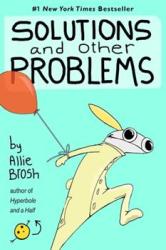
My first introduction to Allie Brosh's work—as I'm sure is the case for many—was the "all the things" meme. For those looking for more depth from these drawings, look no further than the humorous illustrated memoir, Solutions and Other Problems. I have never quite read a book like this. When I picked it up off the shelf, I was expecting a graphic novel, only to be surprised with big chunks of text between illustrations. Clearly, the best of both worlds here. You'll laugh. You'll cry. You'll be glad you read this book.
While it might be easy to discount the simple drawing style at first glance, many illustrations in this book prove to be quite exquisite. The stories themselves, which are not all silly or humorous, aid this distinction. Solutions and Other Problems subverted my expectations by being both hilarious and deeply profound. I've never read a book that had both a story about an obsessed kid stealing things from a neighbor's house and an examination of loss and depression. And yet, they both work in this context.
As these essays are deeply personal, I can say I don't particularly agree with some of the choices presented here. And that's fine. Everyone is different, and these are definitely the stories the author wanted to convey. I just don't want to endorse this book without providing the caveat that I probably wouldn't do things the way the author did them. Still, if you're going through some tough times, then perhaps this book will help break through to you with its humor while also comforting you with the idea that your feelings are valid and shared by other people.
The best half-graphic novel/half-memoir I've ever read, I give Solutions and Other Problems 4.0 stars out of 5.
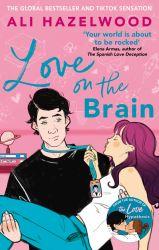
Love on the Brain is stacked full of misunderstandings. When Bee Königswasser gets her dream job at NASA, she is ecstatic, except when she realizes her archnemesis, Levi, is her co-worker. So, who does she blame when her equipment stops working? Or when the staff ignores her? Levi. Through all of Bee’s misadventures, the reader is pulled along seamlessly and introduced into the narrative with an enviable writing style.
So here’s an equation: Romance plus STEM equals?
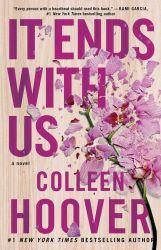
"It Ends With Us" by Colleen Hoover is a real and effective novel that explores the story of Lily Blossom and Ryle Kincaid. This book very evidently gives off the message, that it is okay to not be normal. To be scared to make tough choices. I think of this book as Hoover's courageous attempt in relation to her personal life to share awareness about abuse and harassment. I believe reading this novel will help change many lives that have been held under similar circumstances. This narrative will help teach people that sometimes, moving on or letting go is the best decision you can make for yourself. I felt proud when Lily was able to make extremely hard life-changing decisions to prioritize herself and her happiness. She is a character to admire and love. Hoover has derived so many layers to each character which adds depth to the story as a whole. Colleen Hoover’s subject is heartbreaking, but in our lives, it’s become such an ordinary deal that we naturally begin to avert our eyes easily from such content.
Love has no boundaries, but your health does. Real love should not end in excruciating pain. Taking your chances will only result in you getting used to the affliction.
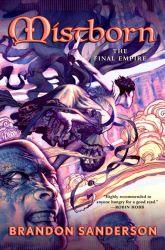
A high-stakes fantasy book about love and sacrifice, Mistborn is absolutely outstanding and a definite read for people who love fantasy. As with any excellent fantasy book, the worldbuilding is enthralling, and the magic system is incredibly distinctive yet easy to grasp. The characters are complex, relatable, and flawed, complemented by the third-person omniscient narration. With this cast of characters, the reader will be taken on multiple emotional rollercoasters before the book concludes. And yes, of course, there is romance layered on evenly throughout the narrative. While it does follow a typical plot, a revolution, or overthrow the corrupt leader, it is done uniquely, and there are twists, and there are turns. Honesty, I could not predict the ending and was left gaping on how intense the book got within the last quarter. As I said, I one hundred percent recommend Mistborn. It is an unforgettable read.
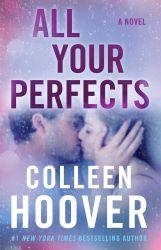
"All Your Perfects" by Colleen Hoover is a deep, emotional novel that delves into the complexities of marriage and the impact it has on the physical and emotional well-being of its characters. The story primarily revolves around Quinn and Graham, a couple who were once so deeply in love but find their relationship strained by the challenges of infertility, putting their marriage to the test. Colleen Hoover's narrative represents a tale of love, loss, and resilience, exploring the ups and downs of this couple's journey.
I give "All Your Perfects" a solid 4-star rating because the book shines in its depiction of the many struggles people face in maintaining a healthy, thriving marriage. I love how it addresses the issue of infertility, shedding light on how it can strain even the most loving relationships. This novel also doesn't shy away from the emotional toll this takes on the characters, which makes it a relatable and thought-provoking read for those who have faced similar challenges. Hoover's writing is very engaging, and she masterfully captures the depth of the emotional agitation that couples may tend to experience when dealing with such issues. This novel clearly excels in its portrayal of human vulnerability and the strength it takes to navigate the complexities of love and marriage, making it a compelling read.
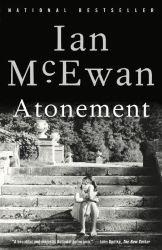
"Atonement" is the story of thirteen year old Briony and her misunderstanding of the world. It begins in the Tallis household in 1935. Obsessed with fantasy and books, she sees sinister motivations in the blossoming romance between her sister and the son of the family's house cleaner. When something terrible happens, Briony makes a mistake that will change the lives of everyone around her.
The characters in this story are all well developed, but Briony is the stand out in this regard. Her motivations straddle the line between clearly defined and mysterious. She has a clearly defined character, dramatic, self centered, and eager to please. Cecilia and Robbie are less defined, but still sympatheic and interesting. I found Robbie slightly unpleasant in the second half of the book, but it was understandable considering the circumstances.
The plot cannot be properly discussed without getting into spoilers. However, it unfolds in a clear manner. All the plot points are set up before they happen, and given proper foreshadowing. At the end, there is a plot twist. Since I highly recommend this book, I will not be spoiling the twist. However, I will say that it makes everything else that happened in the book unclear (in the best possible way).
This book contains a depiction of rape, extreme violence, and rather gruesome hospital scenes. If any of these subjects upset you, I would not recommend this book. If you are able to handle these topics, and you appricate books that focus on pyschology and character exploration, I would definitely recommend this book.
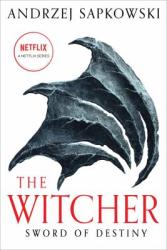
In the second collection of short stories that start the Witcher saga, Sword of Destiny helps to further broaden the setting and characters that would eventually be used in Blood of Elves . Following somewhat chronologically and expanding upon ideas first covered in The Last Wish , this collection continues to flesh out characters like Geralt and Yennifer while also introducing characters like Ciri. While they're fine stories by themselves, they pale in comparison to long-form novels like Blood of Elves, mainly because of their episodic nature.
I applaud author Andrzej Sapkowski for using these short stories to introduce the world-building of the Witcher series. While some writers might just make character sheets for their characters, he actually puts them in interesting situations to see what they would do. From a writing standpoint, I'd recommend this method of concept development as it gives certain edge cases or rarer character interactions to see where the limits of the characters lie. After all, figuring out what works in short form helps the longer pieces feel grounded. It helps when there are such strong characters to work with, though.
My only qualm with this collection was that nothing was particularly memorable. Sure, if I had read this before Blood of Elves, I might feel differently. As it is, I already know how Geralt handles himself, what drives Yennifer, and how Ciri has more going for her than even she knows. Since I'm writing this review many months later, I had to remind myself what even happened in it. Some stories in this book were covered in the first season of the Netflix adaptation, which made remembering them easier. Still, it's a solid collection and should be required reading for anyone who wants to get into the Witcher series.
Another great, but hardly memorable, collection of short stories, I give Sword of Destiny 3.5 stars out of 5.
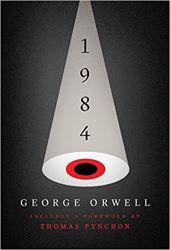
Although George Orwell crafted a rather interesting dystopia, the story he built around it largely fell flat. It was apparent throughout the novel that Orwell was more of an essayist than a storyteller; he was more interested in explaining the structure of his setting to his audience rather than showing them how that structure affects the story. 1984 suffers from hundreds of pages of blunt exposition-dumping that disconnects the reader from the characters and plot. While there is significant payoff at the end, the rising action was rather lacking in weight as the main character spends more time describing the logistics of the 1984 world rather than where he fits in it. Some aspects of Orwell's famous dystopian are intriguing, like the use of Newspeak or the new family dynamics, though it is overall disappointing.
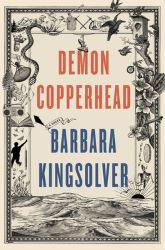
The sole way to describe Demon Copperhead by Barbra Kingsolver is a long, dark coming-of-age narrative. Demon Copperhead, born and raised in the southern Appalachian mountains by a single drug-addicted teenage mother, is seemingly designed for failure the moment he was born. Throughout his childhood, Demon confronts an abusive stepfather, an addicted mother, exploitive fosters, and selfish friends. As he faces a life of mistrust, inadequacy, and poverty, Demon relies on his wits to survive. While the book is lengthy, there is never a dull moment or lull in the plot, and the characters within the narrative are dynamic, adding depth to the story. The writing style effectively lures the reader into the constructed world of Lee County.
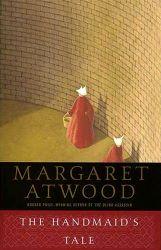
Warning: this book contains depictions of rape and violence. If either of these are sensitive topics for you, I would reccomend finding a different book.
"The Handmaid's Tale" is a story about a country that rises after the fall of America. In it, traditional gender roles are enforced by the government. Women are forced into the role of Wives, Marthas (women who clean the house), Aunts (women who are in charge of other women), and Handmaids (women who have sex with men to give them children). Offred has been taken from her husband and child, put into reducation, and forced to be a Handmaid for a commander. She makes her way through the new world while trying to keep fragments of her sanity, individuality, and happiness.
The descriptions in this book are incredible, almost poetic. The charcters in this book are all well defined, and feel like real people. Offred was a standout to me. Though she is the hero in the book, there's an inherent selfishness in her character. She has an affair with a married man. She decides not to help the resistance. She constantly mocks a woman who has been raped. Oftentimes stories will try to make a dystopia seem worse by making their protagonists innocent and pure. By making Offred so flawed, it draws attention to the fact that this treatment is unacceptable no matter who it's being done to.
The worldbuilding of Gilead is haunting. Margret Atwood has said that everything she put in "The Handmaid's Tale" has happened in history somewhere. That's probably part of why this book feels so real. Though it might seem unbelievable that a society could collapse and revert to such archaic values, looking into real life societal collapses makes it seem much more feasible.
I could talk about this book for far longer, but that would be unwise. In summary, "The Handmaid's Tale" is a wonderful, if not unsettling, read. I would reccomend it to fans of speculative fiction, anyone interested in learning about gender equality, and anyone who can handle a thought provoking read. As I said in the beginning though, this book can be upsetting at parts, so judge for yourself if you can handle that.
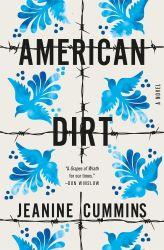
Against all odds, Lydia and her son, Luca, survive a brutal cartel massacre, leaving them with only one option: to embark on a dangerous and arduous journey to seek safety in the United States. American Dirt by Jeanine Cummins is a harrowing story about the survival, resilience, and hope of migrants fleeing north to the United States. Cummins skillfully captures the hardships, fears, and hopes of these characters, providing a window into the harsh realities faced by those making the perilous trek north. American Dirt humanizes the migrant experience by creating empathetic and multifaceted characters, illustrating the diversity within the migrant community and their shared aspirations for a better future.
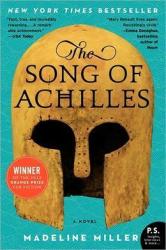
I loved this book! The detail in these stories was terrific and made the book a lot easier to follow. The story was entertaining and kept you on the edge of your seat at some parts. My only dislike about this story is that in the beginning of the book when Patroclus is naming all of the different Greek gods and demigods and such, so many names did get a bit confusing. It was a bit hard to follow but only lasted for about the first chapter and was an easy read after that. I rated this book 5 stars because the Greek mythology base in the story was very interesting, and you grew to love the characters as you read it. It made me smile, laugh, and cry. Genuinely a great book. In my opinion, this book is meant for young adult readers, I would say 15+ in my opinion. It does contain some violence but nothing too graphic and one brief sexual content scene but does not go into much detail. Would definitely recommend it!
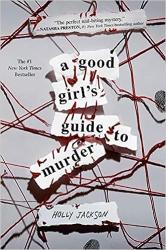
One of my favorite books so far. The book is full of twists and turns and one of the most gripping story. I loved most of the characters.
Every chapter showed us a new suspicious person. Every chapter changed the perspective towards each character. I loved this series. At last it's not a book of black and white, there were so much gray ...
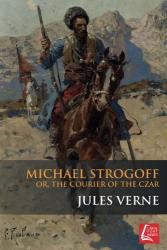
While we mostly know Jules Verne for his science fiction stories, it's hard to miss the fact that his books are also quite adventurous. Even though Michael Strogoff: Courier to the Czar isn't one of his famous works, it may be one of his best. This book was something my father wanted his children to appreciate, and now that I've read it a few more times, I truly understand how ahead of its time it was.
Even if Michael Strogoff isn't explicitly a science fiction novel, Jules Verne still sneaks plenty of science into this race across Russia to save the life of the Czar's brother. Of course, since it is an adventure novel, Michael Strogoff certainly has a lot of adventure between Moscow and Irkutsk, with some scenes feeling like they were pulled out of a modern action film. The tension of sneaking behind enemy lines to deliver an important message never lets up. I don't want to give too much away, but there are quite a few well-written twists that show Verne's mastery of this "Russian James Bond."
Of course, there are still some tropes that are an artifact of the time when it was written. Cultural stereotypes are present and the age difference between Michael (a 30-year-old man) and Nadia (a 16-year-old girl) is uncomfortable considering how the story ends. Also, Verne describes Michael as this specimen of a man that borders on eye-rolling machismo. Still, there are plenty of interesting characters, including Alcide Jolivet and Harry Blount, who provide some humor in an otherwise serious adventure. If you like Jules Verne books, you'd definitely like Michael Strogoff.
A hidden gem of a Jules Verne adventure, I give Michael Strogoff: Courier to the Czar 4.5 stars out of 5.

"The Sword Defiant" by Gareth Ryder-Hanrahan is the greatest exploration of what lies beyond the "happily ever after" that I have ever read. There are two main protagonists; Aelfric the Lammergeier and his sister, Olva. Aelfric, or Alf, is a member of the most famous adventuring party, called the Nine. They famously defeated a malevolent force of darkness 20 years before the events of "The Sword Defiant". Large elements are immediately reminiscent of a Dungeons and Dragons campaign. However, rather than focusing directly on battles, duels, and direct combat, Hanrahan instead uses these 20 years to explore how a world is altered after a massive war through Alf's perspective. My least favorite part of "The Sword Defiant" was when Olva was the primary focus. Olva's sections take an even larger step back from action, but the purpose of Olva is unclear even after the climax. I struggled to understand the purpose of Olva. She appeared to just be a thing that Alf needed to protect, or she appeared to be just a tool for the author to see the world from the view of a commoner. This leads to the best part of the book: the world-building. Every single detail about the environment, the populace, culture, class division, species division, species interaction, species history, magic, and more felt important to understand. Each of those elements were also explored, typically through Alf. The Nine have their own interesting backstories, and each member also represents an archetypal Dungeons and Dragons character. Too many beautiful interactions occur between members to present but even the smallest remarks are hitting on the previously mentioned elements of world building. There are the typical fantasy races like Dragons and Dwarves, but there are also the stranger ones like Vatlings and Witch Elves. When Gundan (a dwarf) talks about the Elves, it's always something negative. When anyone ever mentions Peir (the dead one who sacrificed himself 20 years ago), they always talk about his best characteristics. The ending will make that interesting, as well as the development of the secret villain in the end. All in all, this would have been the best fiction book I have read this year if it wasn't for the slog also known as Olva's sections.
Reviewer Grade: 11
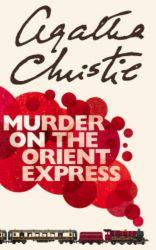
"Murder on the Orient Express" by Agatha Christie is pure murder mystery. It starts off innocently enough when Mr. Ratchett is found having been stabbed in his sleep, but the case quickly becomes more and more complicated. Hercule Periot has to struggle to find the true culprit in the mystery that gets more tangled by the second.
The characters in this book are all rather good. While none of them have outstanding depth, they are all interesting and well defined. Hercule is, of course, the standout. His methodolgy is always fun to read. The suspects cannot be discussed without getting into spoilers. Even the victim is interesting to read about.
Most readers will probably know the twist of the book (which I will not be spoiling). Still, it's wonderfully set up, and almost every piece of evidence contributes to the climax in some way. New evidence is constantly presented throughout the story. At times it was a bit hard to follow, but I'm notoriously bad at following along with mysteries.
Nothing in this story is particularly deep, but it doesn't need to be. It's just a captivating mystery story. One of Agatha Christie's best.
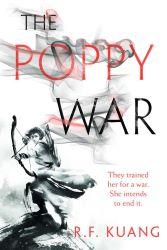
When I picked up The Poppy War by R. F. Kuang, I sought a good, possibly wonderful, fantasy book, as one would expect from a New York Times best-selling author. What I was not expecting was to be enlightened and disturbed to the same degree within its 544 pages. Now let me back up; The Poppy War is a historical and grimdark fantasy that draws its plot from mid-20th-century China, with the main conflict based on the Second Sino-Japanese War. The book provides insight into the brutality of war and its aftermath. While the book is based on the Second Sino-Japanese War, the author does a wonderful job constructing an immersive plot and charming characters taking creative liberties to make the book a story of its own. I would highly recommend this book.



 Ruth Holley Library will be temporarily closed for approximately one week starting Mon., Dec. 2 to complete roof repairs.
Ruth Holley Library will be temporarily closed for approximately one week starting Mon., Dec. 2 to complete roof repairs.